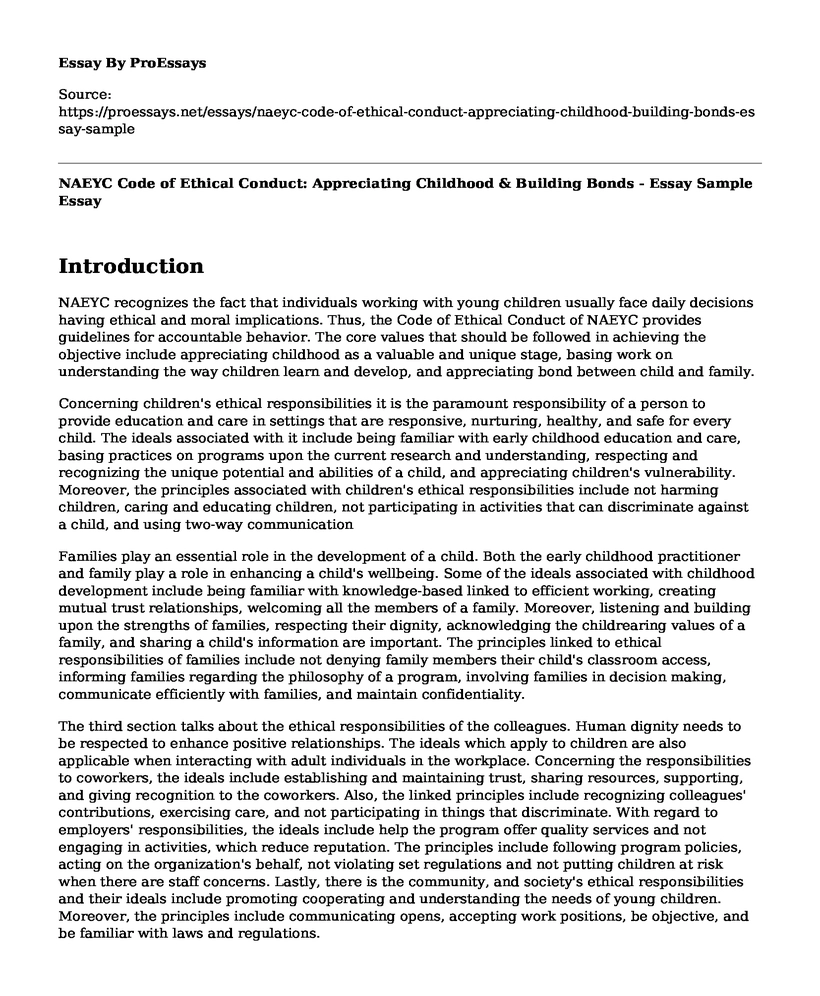Introduction
NAEYC recognizes the fact that individuals working with young children usually face daily decisions having ethical and moral implications. Thus, the Code of Ethical Conduct of NAEYC provides guidelines for accountable behavior. The core values that should be followed in achieving the objective include appreciating childhood as a valuable and unique stage, basing work on understanding the way children learn and develop, and appreciating bond between child and family.
Concerning children's ethical responsibilities it is the paramount responsibility of a person to provide education and care in settings that are responsive, nurturing, healthy, and safe for every child. The ideals associated with it include being familiar with early childhood education and care, basing practices on programs upon the current research and understanding, respecting and recognizing the unique potential and abilities of a child, and appreciating children's vulnerability. Moreover, the principles associated with children's ethical responsibilities include not harming children, caring and educating children, not participating in activities that can discriminate against a child, and using two-way communication
Families play an essential role in the development of a child. Both the early childhood practitioner and family play a role in enhancing a child's wellbeing. Some of the ideals associated with childhood development include being familiar with knowledge-based linked to efficient working, creating mutual trust relationships, welcoming all the members of a family. Moreover, listening and building upon the strengths of families, respecting their dignity, acknowledging the childrearing values of a family, and sharing a child's information are important. The principles linked to ethical responsibilities of families include not denying family members their child's classroom access, informing families regarding the philosophy of a program, involving families in decision making, communicate efficiently with families, and maintain confidentiality.
The third section talks about the ethical responsibilities of the colleagues. Human dignity needs to be respected to enhance positive relationships. The ideals which apply to children are also applicable when interacting with adult individuals in the workplace. Concerning the responsibilities to coworkers, the ideals include establishing and maintaining trust, sharing resources, supporting, and giving recognition to the coworkers. Also, the linked principles include recognizing colleagues' contributions, exercising care, and not participating in things that discriminate. With regard to employers' responsibilities, the ideals include help the program offer quality services and not engaging in activities, which reduce reputation. The principles include following program policies, acting on the organization's behalf, not violating set regulations and not putting children at risk when there are staff concerns. Lastly, there is the community, and society's ethical responsibilities and their ideals include promoting cooperating and understanding the needs of young children. Moreover, the principles include communicating opens, accepting work positions, be objective, and be familiar with laws and regulations.
Cite this page
NAEYC Code of Ethical Conduct: Appreciating Childhood & Building Bonds - Essay Sample. (2023, Jun 22). Retrieved from https://proessays.net/essays/naeyc-code-of-ethical-conduct-appreciating-childhood-building-bonds-essay-sample
If you are the original author of this essay and no longer wish to have it published on the ProEssays website, please click below to request its removal:
- Online Learning in Higher Education
- Effective Learning of the Severely Disabled Students
- Recommendations on the Best Ways to Become Effective in Education for Teachers
- Leadership in Education: Understanding Impact & Administration for Student Success
- Essay Sample on School Principal's Responsibility for Student Safety in Learning Institution
- Essay Example on Selecting Higher Learning Institutions: Challenges for Adult Students
- Essay Example on Homeschooling: Flexibility & Isolation Challenges







